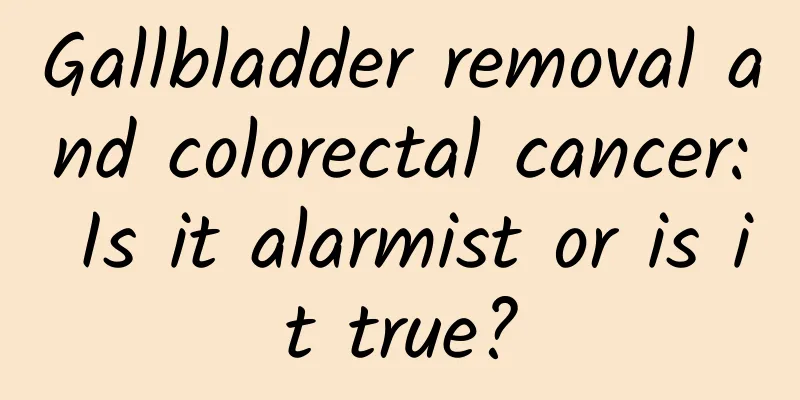Gallbladder removal and colorectal cancer: Is it alarmist or is it true?

|
In the medical field, there has always been controversy about gallbladder removal, especially when some patients unfortunately develop colon cancer after gallbladder removal. This concern is even more prominent. People can't help but wonder: Does gallbladder removal really cause colon cancer? Today, we will uncover this mystery and explore the importance of the gallbladder and the pros and cons of gallbladder removal. 1. Gallbladder: A small but critical human body part The gallbladder, a small organ located in the upper right abdomen close to the liver, is inconspicuous, but it has the important task of storing and concentrating bile. Every day, it receives and concentrates about 500 ml of bile so that it can be quickly released into the intestines after a meal to help digest fat. Therefore, the gallbladder is essential for maintaining normal digestive function. However, in some cases, such as severe cholecystitis, gallstones or gallbladder polyps, the gallbladder may no longer be suitable for preservation. These conditions not only seriously affect the quality of life, but may also be life-threatening. At this time, gallbladder removal becomes a necessary treatment. 2. Gallbladder removal and colon cancer: coincidence or inevitability? There is a saying on the Internet that "removing the gallbladder will increase the risk of colorectal cancer", which does frighten many patients. But in fact, this view has not been supported by conclusive evidence in the medical community. Although some studies have shown that the intestinal burden may increase and bile acid circulation may change after gallbladder removal, it is still unclear whether these factors directly lead to the occurrence of colorectal cancer. Liu Haiying, director of the Gastrointestinal Tumor Surgery Department of the Affiliated Cancer Hospital of Guangzhou Medical University, pointed out that although some patients have been observed to develop colorectal cancer after gallbladder removal, the causal relationship between the two has not yet been clarified. 3. The "sequelae" after cholecystectomy cannot be ignored Although gallbladder removal is necessary in certain situations, this surgery is not without risks. After losing a gallbladder, patients may face a series of "sequelae": Decreased digestive function: After cholecystectomy, bile cannot be effectively concentrated, resulting in weakened digestive function. Patients may experience symptoms such as abdominal distension and diarrhea. Increased incidence of bile duct stones: The absence of the gallbladder increases the pressure in the bile duct, which can easily induce common bile duct stones. Reflux gastritis and esophagitis: After bile flows directly into the intestines, it may flow back into the stomach, causing damage and inflammation of the gastric mucosa. 4. Protect your gallbladder, starting from daily life For most people, the key to maintaining a healthy gallbladder lies in daily lifestyle habits. Here are some practical suggestions: Eat three meals regularly, especially breakfast: skipping breakfast will cause bile to remain in the gallbladder for a long time, increasing the risk of stone formation. Reduce the intake of high-fat and high-calorie foods: these foods will stimulate gallbladder contraction and increase the burden on the gallbladder. Moderate exercise: Sitting less and moving more can help promote bile excretion and gallbladder contraction, reducing the risk of cholestasis. Gallbladder removal does not directly lead to colorectal cancer, but this operation may indeed bring a series of digestive system sequelae. Therefore, when deciding whether to remove the gallbladder, patients should fully understand the risks and benefits of the operation and make decisions under the guidance of a doctor. At the same time, maintaining a healthy lifestyle is essential for preventing both gallbladder disease and colorectal cancer. Remember, a gallbladder without lesions is a guardian of health, while a gallbladder with lesions may become a threat to health. |
Recommend
Reasons for menstruation to come back after menstruation ends
Every woman wants her menstruation to be normal t...
What to do if the fetal movement is not obvious at 21 weeks
For those who do not have obvious fetal movements...
What should you pay attention to in your diet after abortion? I must eat right from now on.
After a woman has undergone an abortion, the scho...
How many months of pregnancy is suitable for listening to prenatal education
During pregnancy, in order to better promote the ...
Unilateral nipple itching
With the secretion of estrogen during puberty, li...
Is cervicitis the same as cervical erosion?
Cervicitis and cervical erosion are both common g...
How long does it take for the gestational sac to reach the uterus?
Generally speaking, it takes about seven to nine ...
The earliest picture of breast cancer
Breast cancer is a type of cancer with a relative...
Beauty and health go against each other, what choice do you make?
Not high enough? We have high heels; not plump en...
A man's spine was twisted into a knot because he crossed his legs!
Expert of this article: Ao Rongguang, MD, associa...
What happens if you take birth control pills and your period comes early?
Key reminder: Emergency contraception is a drug t...
Is there any trace after the drug flowed once?
Female friends should be familiar with abortion. ...
What happens when an ultrasound shows a dark area after an abortion?
After an unexpected pregnancy, if you do not want...
How to prevent arrhythmia in daily life? Will arrhythmia lead to myocardial infarction?
Arrhythmia means the heart beats too fast or too ...
What should women pay attention to when undergoing vaginal surgery?
Vaginal surgery for women is a relatively common ...









